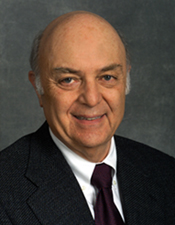March 02, 2012
 The winner of the 2011 Dickson Prize in Science, Marvin L. Cohen, is one of the most influential condensed matter physicists in the world. His work has impacted important fields including nanotechnology and materials science, and has helped to explain superconductivity — something that Einstein thought might never be explained.
The winner of the 2011 Dickson Prize in Science, Marvin L. Cohen, is one of the most influential condensed matter physicists in the world. His work has impacted important fields including nanotechnology and materials science, and has helped to explain superconductivity — something that Einstein thought might never be explained.
Given annually since 1970, the Dickson Prize in Science is awarded by Carnegie Mellon to an individual who has made outstanding contributions to science in the United States. Cohen, who is a University Professor of Physics at the University of California Berkeley, and a senior faculty scientist at the Lawrence Berkeley National Laboratory, will give the Dickson Prize Lecture, titled "Einstein, Condensed Matter Physics, Nanoscience & Superconductivity," at 4:30 p.m., on Thursday, March 8 in McConomy Auditorium.
In his lecture, Cohen will talk about Einstein's research in and contributions to condensed matter physics - the study of the physical properties of condensed phases of matter, like liquids, solids and gases. Cohen also will talk about more recent work in the field including his own research on photovoltaics, nanoscience and superconductivity.
In his early career Cohen developed the "pseudopotential model," which allows scientists to calculate what will happen to materials under intense pressure. The model is used to predict the properties of never-before-seen materials. His later work explained the electronic nature of buckyballs using the standard model of superconductivity. Cohen continues to do research on nanoscience and nanotechnology and in materials science.
"Cohen is world renowned for creating and applying quantum theories to explain and predict the properties of materials," said Fred Gilman, dean of the Mellon College of Science. "His work spans a broad spectrum of phenomenon, and its impacts are most greatly felt in the fields of semiconductor physics and nanoscience."
Cohen's research is among the most influential in physics, with his papers being some of the most cited in condensed matter physics. He has been awarded the National Medal of Science, the American Physical Society (APS) Oliver E. Buckley Prize for Solid State Physics, the APS Julius Edgar Lilienfeld Prize, the Foresight Institute Richard P. Feynman Prize in Nanotechnology, the Technology Pioneer Award from the World Economic Forum and the Berkeley Citation.
He is a fellow and past-president of the APS, a fellow of the American Association for the Advancement of Science, and a member of the National Academy of Sciences, the American Academy of Arts and Sciences and the American Philosophical Association.
The lecture is free and open to the public.
What: Dickson Prize Lecture, "Einstein, Condensed Matter Physics, Nanoscience & Superconductivity"
When: 4:30 p.m., Thursday, March 8
Where: McConomy Auditorium
Online: www.cmu.edu/dickson-prize/
Lecture Spotlight: Dickson Prize Winner Helps Explain Superconductivity
By Jocelyn Duffy
 The winner of the 2011 Dickson Prize in Science, Marvin L. Cohen, is one of the most influential condensed matter physicists in the world. His work has impacted important fields including nanotechnology and materials science, and has helped to explain superconductivity — something that Einstein thought might never be explained.
The winner of the 2011 Dickson Prize in Science, Marvin L. Cohen, is one of the most influential condensed matter physicists in the world. His work has impacted important fields including nanotechnology and materials science, and has helped to explain superconductivity — something that Einstein thought might never be explained.Given annually since 1970, the Dickson Prize in Science is awarded by Carnegie Mellon to an individual who has made outstanding contributions to science in the United States. Cohen, who is a University Professor of Physics at the University of California Berkeley, and a senior faculty scientist at the Lawrence Berkeley National Laboratory, will give the Dickson Prize Lecture, titled "Einstein, Condensed Matter Physics, Nanoscience & Superconductivity," at 4:30 p.m., on Thursday, March 8 in McConomy Auditorium.
In his lecture, Cohen will talk about Einstein's research in and contributions to condensed matter physics - the study of the physical properties of condensed phases of matter, like liquids, solids and gases. Cohen also will talk about more recent work in the field including his own research on photovoltaics, nanoscience and superconductivity.
In his early career Cohen developed the "pseudopotential model," which allows scientists to calculate what will happen to materials under intense pressure. The model is used to predict the properties of never-before-seen materials. His later work explained the electronic nature of buckyballs using the standard model of superconductivity. Cohen continues to do research on nanoscience and nanotechnology and in materials science.
"Cohen is world renowned for creating and applying quantum theories to explain and predict the properties of materials," said Fred Gilman, dean of the Mellon College of Science. "His work spans a broad spectrum of phenomenon, and its impacts are most greatly felt in the fields of semiconductor physics and nanoscience."
Cohen's research is among the most influential in physics, with his papers being some of the most cited in condensed matter physics. He has been awarded the National Medal of Science, the American Physical Society (APS) Oliver E. Buckley Prize for Solid State Physics, the APS Julius Edgar Lilienfeld Prize, the Foresight Institute Richard P. Feynman Prize in Nanotechnology, the Technology Pioneer Award from the World Economic Forum and the Berkeley Citation.
He is a fellow and past-president of the APS, a fellow of the American Association for the Advancement of Science, and a member of the National Academy of Sciences, the American Academy of Arts and Sciences and the American Philosophical Association.
The lecture is free and open to the public.
What: Dickson Prize Lecture, "Einstein, Condensed Matter Physics, Nanoscience & Superconductivity"
When: 4:30 p.m., Thursday, March 8
Where: McConomy Auditorium
Online: www.cmu.edu/dickson-prize/
